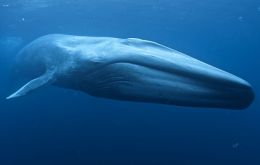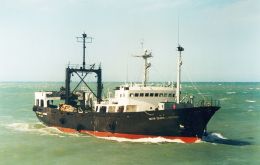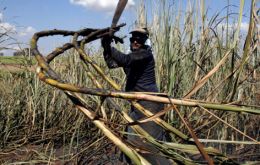MercoPress. South Atlantic News Agency
Environment
-
Thursday, May 2nd 2013 - 07:45 UTC
Brazil leads meeting of Amazon basin Cooperation Treaty in Ecuador

Brazilian Foreign minister Antonio Patriota arrives Thursday in Ecuador for bilateral talks on trade, investment and immigration, and to attend a day later the Amazon group summit of ministers, reports Itamaraty palace.
-
Tuesday, April 30th 2013 - 22:59 UTC
Chilean navy tugboat checking Antarctica area where Chinese factory ship went down

A tugboat from the Chilean Navy equipped for environmental emergencies is trying to determine the position where the remains of the Chinese factory ship Kai Xin went down in Antarctica last week after catching fire and left adrift by the 97 member crew rescued by a Norwegian vessel and a reefer.
-
Tuesday, April 30th 2013 - 21:00 UTC
UK Ministry of Defence deems wind towers a national security threat

By John C.K. Daly of Oilprice.com - Twenty-plus years on, the collapse of the USSR in 1991 threatened massive Western defence budgets, bereft of a major enemy like the “Evil Empire.”
-
Saturday, April 27th 2013 - 03:55 UTC
Argentina makes available a Coast Guard vessel for the Antarctic Blue Whale Project”

Argentina will make available a Coast Guard vessel in support of the ‘Antarctic Blue Whale Project’ and associated research activities planned for the 201314 season and coming years, according to a release from the Southern Ocean Research Partnership, SORP.
-
Saturday, April 27th 2013 - 03:28 UTC
South Georgia ‘area’ will be surveyed by Argentine scientific research vessel

Argentina’s scientific research vessel “Dr. Eduardo L. Holmberg” left on Friday from Mar del Plata for the South Georgia area for a thirty day cruise in the framework of the Convention for the conservation of Antarctic marine living resources, CCAMLR, reports the Foreign Ministry from Buenos Aires.
-
Friday, April 26th 2013 - 14:48 UTC
Falkland Island's Conservation review and appeal on World Penguin Day

This week penguins are celebrated through World Penguin Day (Thursday April 25) and Sarah Crofts from Falklands Conservation explains why more research is desirable on them in the Islands.
-
Wednesday, April 24th 2013 - 05:49 UTC
Brazil to the rescue of the sugar-ethanol industry with lower taxes and soft credit

The Brazilian government has come to the rescue of the sugar-ethanol industry announcing that as of next May first the mandatory content of ethanol in gasoline will increase from 20% to 25%, taxes on the sugar-cane fuel will be eliminated and there will be soft loans to keep expansion going.
-
Monday, April 22nd 2013 - 08:54 UTC
Antarctica tour operators hold four-day annual meeting in Punta Arenas

Punta Arenas in the extreme south of Chile will be hosting until next Thursday the four-day annual meeting of the International Association of Antarctica Tour Operators, IAATO which has a confirmed attendance of over a hundred representatives from the industry.
-
Tuesday, April 16th 2013 - 03:30 UTC
Antarctica summer ice melt at it highest level in 1.000 years

The summer ice melt in parts of Antarctica is at its highest level in 1,000 years, Australian and British researchers reported on Monday, adding new evidence of the impact of global warming on sensitive Antarctic glaciers and ice shelves.
-
Tuesday, April 9th 2013 - 02:14 UTC
US Navy launches latest state-of-the-art oceanographic survey ship

The United States Navy christened and launched its newest oceanographic survey ship, USNS Maury (T-AGS 66), the last of its class at VT Halter Marine’s shipyard in Moss Point, Mississippi.
